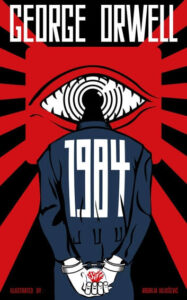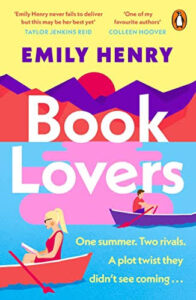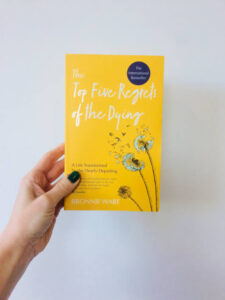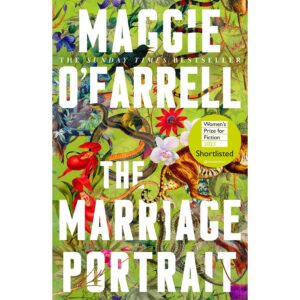This month I saw myself being more explorative about what I was reading. Different genres, a few of which I enjoyed exploring and a few which I still need convincing about. These are the honest opinions of the book I read this month.
1. 1984 by George Orwell.

Dystopia has never been my cup of tea. When people would sing praises of Haruki Murakami’s work, I would be left scratching my head wondering what the fuss was all about. After a busy day at work, entering a dystopian world meant giving my exhausted brain more homework to do, which drained out all the fun of reading. Which is why, this book remained on my TBR pile for a gazillion years. But this month, when I ran out of anything interesting to read and had a lazy sunday waiting to be spent, I braved the hesitation and delved in.
Written in 1949, the book speaks of a world where all humans are controlled by the government, slyly named the “Big brother” – the one who is supposed to protect, provide and support. In the garb of doing so, the government actually controls, distorts and punishes – anyone who dares to oppose its dictates. The ultimate goal of the big brother is to erase free thinking and emotions, change reality as and when it is required. Big brother devotes an enormous work force into maintaining this control and all the subjects are monitored 24*7*365 days, to see whether they are slipping out of the closed fist. Of course, there are people who do not subscribe to this agenda, but they live on the fringes of society with no basic amenities, education or a sense of purpose.
The book is written from the perspective of the hero who wants to overthrow the system and how his tiny, half baked rebellion gets squashed. He gets tortured until he finally submits himself to the existing system mindlessly.
The first thought which came to me was that I might be reading about the life of people in North Korea, or maybe China. But later, I felt that most governments try in various extents to do the same. Maybe it is necessary to maintain a semblance of stability in a society prone to anarchy and chaos. Their sense of utopia then becomes our dystopia.
Chilling & slightly depressing, but a must read!
2. Books Lovers by Emily Henry.

To get out of the depression caused by 1984, the next book I picked was a light read. This was a book highly recommended by a lot of book tubers. It is a standard enemies to lovers trope set in New York and the country side of the United States. It’s appeal quotient increased because both the protagonists work in the book industry and are book lovers. The heroine is not a damsel in distress but actually the savior and knight in armor for her sister. Everything to like and nothing to hate:) This is an easy one sit read and gives out cozy vibes for the winter.
3. The lost Daughter by Elena Ferrante.

Wanting to try something I’ve never tried before, I picked up a novella. The author is actually Italian and the book translated. It is a small book, a hundred and forty pages or so of tightly packed emotions. It starts innocently enough with an English professor taking a holiday on a beach front. Her daughters have moved to live in far away Canada and she is now free to spend her time without the assumed responsibility of her children. On the beach, she gets acquainted with an Italian family, specifically, a mother and child duo. It then, slowly unravels the professor’s relationship with her daughters and her mother. The book tried to portray that no mother is perfect and so it should be. We all have picked parenting from our parents and are a product of our thinking and personalities. Hence stereotyping and glorifying motherhood makes it a highly pressurized profession from which there is no escape. Instead, let us allow ourselves to be imperfect, a little weird and accepting of this so that we can be guilt free parents. That would probably be a better parenting model than the “perfect”, self sacrificing, never complaining mother type!
4. The 5 regrets of the dying by Bronnie Ware

I read about this book on an instagram page and immediately downloaded it on my kindle. Sometimes, what you need is serendipitously provided by the universe – and this book was one such. It is written by a nurse companion, working in the area of palliative care. Currently the author is also a motivational speaker, blogger and a musician. It speaks about the experiences that she had while in conversation and living with terminally ill patients. It explains the five main takeaways for her life from them. What makes this book different is that the author herself, seems to be a misfit and a psychologically vulnerable person navigating her way through life. How she puts the lessons to use to heal herself and the readers is the premise. She is the black sheep of the family who flits from one job to another without finding any stability till her late forties. She is a person with multiple interests who cannot focus her life on one. Living in a competitive culture which harps on a model of success based on how much you focus on your job, this book gave me the perspective that the universe is benevolent to all types of people. We can meander to find our goal and happiness at any age. Our definition of success is not absolute. A kind, happy and healthy person is already a success. And this made my thinking expand spiritually in some way too.
There are some parts of the book did not resonate well with me like the author’s methods of self healing of her depression or the way the book becomes a tad too philosophical at times ( I feel it is difficult to be so zen always – but then when you live with death on an everyday basis, it may just become a job skill). On the whole, a beautiful read guaranteed to spill a few tears along the way.
5. The Marriage Potrait by Maggie O’ Farell.

The blurb on the back of the book spoke of the tale of a sixteen year old duchess who was suspected to have been murdered by her husband. History and a murder mystery together have always been my mojo.
Gearing myself up for an exciting few hours, I was left struggling with completing the book. The author’s style of writing is very very descriptive. While the first few pages of this make you feel as though you are getting into the atmosphere of the story, it slowly becomes super tedious. You literally forget the plot because of the detailed explanations of the dress, the painting, the room and so on. The story also, I felt, did not, despite its 380 page length delve into why Lucrezia’s (the duchess ) husband actually wanted to kill her so desperately. True, he was a control freak and probably had some personality disturbance, but there appeared to be no intense motive. Lucrezia herself is portrayed so stereotypically ( the black sheep, highly talented, more interested in painting than fashion, independent) that you cannot identify with her or root for her.
All in all, a mild disappointment afterb a great start.
This was all for October. Do let me know if I should continue doing book reviews (coz I love them) or not!




